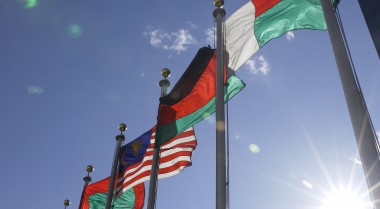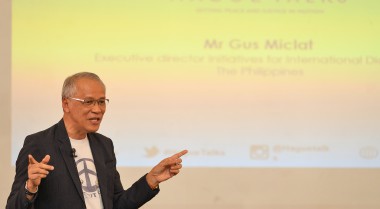Economic integration as a Conflict Prevention Tool: South Caucasus
In recent months, GPPAC in the South Caucasus has held a series of discussions with civil society and media representatives from Georgia and Armenia on how economic integration might help resolve the region's frozen and active conflicts and prevent re-escalation.
With the collapse of the Soviet Union in 1991, armed conflicts arose where newly independent states included areas that were previously either autonomous or held special status within the Soviet Union. These conflicts led to over 30,000 deaths and 1.5 million displaced people. The armed conflicts ended, but no peace treaty or other political framework resolved them, leaving them frozen.
Nearly 30 years later, these frozen conflicts remain and their number has increased: Nagorno-Karabakh, Transnistria, Abkhazia and South Ossetia are all protracted conflicts, and eastern Ukraine may become one. International mediation has not been able to solve them, and the conflict-separated nationalities have not found peaceful solutions to problems. These conflicts may resume at any moment.
The majority of the countries with frozen conflicts in their territories have expressed the wish to become EU and NATO members in the longer term. Economic integration is seen as one of the possible ways forward to deal with the frozen conflicts. In the South Caucasus, frozen conflicts have been important drivers for countries to start the economic integration processes. The Georgia-EU Association Agreement (AA) with Deep and Comprehensive Free Trade Area (DCFTA) and Armenia's accession to the Russian-led Eurasian Economic Union (EEU) are two clear examples.
Despite questions about the effectiveness and efficiency of economic integration treaties to prevent conflicts in the South Caucasus, they certainly provide a chance for the secessionist regions to overcome isolation and improve their economies. Sources indicate that some businesses there are seeking the opportunity of exporting their niche products (e.g. strawberries, citrus fruits, kiwi and wine in Abkhazia) to markets other than Russia. The social-economic benefits which Georgia will eventually reap from its agreement with the EU may make it attractive for the secessionist regions and contribute to a peace dialogue.
Civil society organisations play a key role here. As there is little or inaccurate information about the different trade agreements, civil society organizations can ensure correct information is disseminated.
Governments'political will and dedication to conflict settlement are necessary to enable economic operators in the secessionist regions to access the preferential tariffs to which they are entitled; making proposals for how this might be guaranteed post-DCFTA.
ICCN (www.iccn.ge), GPPAC Regional Secretariat for the South Caucasus, launched the project "New re-division and diversification of economic ties in the Region of South Caucasus."The project covers Georgia and Armenia, which are members of the competing integrationist projects and economic unions AA/DCFTA and EEU. The project seeks to strengthen conflict prevention mechanisms and infrastructures and increase access, political space and opportunities for civil society to engage in Georgia and Armenia. The project, which includes all members of the GPPAC South Caucasus network, conducts civil society dialogue, thematic group meetings, and discussions with Peace Journalists.
ICCN has brought together Georgian and Armenian civil society organizations and media representatives to find answers to questions ofconfidence building and conflict prevention in the region. They made recommendations and suggestions about ways in whichthe AA/DCFTA and EEU agreements could exist side-by-side and relieve possible conflicts related to both economic and political aspects of the problem the in South Caucasus. Some, however, call for a realistic approach and reckoning with external factors. Some participants in the Dialogue process argued that the competition between AA/DCFTA and EEU might affect the lives of citizens in Georgia and Armenia. "We must assess the existing situation as realistically as possible and define clearly opportunities for applying DCFTA as an instrument for conflict prevention keeping in mind that Russia might wind down these attempts," the dialogue participants said.
So far, neither Russia nor the EU has taken any meaningful steps to cultivate cooperation for relieving the problems in trade-economic and most likely political relations between the participants in the AA/DCFTA and EEU. Nevertheless, Armenia, Georgia and Azerbaijan are seeking to avoid becoming locked into an ‘either-or' choice with regard to these two integrationist structures. The two competitive economic integration projects risk deepening intra-regional political fault lines through the creation of ‘harder' local customs borders within the region. Such a development could have a particularly negative impact on cross border communities.
The discussions show that one of the main issues here is whether the EU can reshape its role in South Caucasus and build effective strategies to resolve the protracted conflicts there. The CSO dialogue tried to find answers on this and related questions which come upon the context of existing and looming economic realities in the region. According to the dialogue participants, as implementation of DCFTA and EEU gains momentum, Georgian-Armenian economic ties might encounter problems. Armenia following the EEU regulations will establish barriers for the goods imported from the countries that are members of AA/DCFTA. Now the countries are in a transitional period and neither AA/DCFTA nor EEU hinder a free movement of the goods between Georgia and Armenia.
The CSO Dialogue and resulting policy recommendations contribute to the process of finding a solution for better economic integration and coexistence of AA/DCFTA and EEU in South Caucasus. By the end of the project participants of the CSO dialogue will produce Policy Papers on the salient issues regarding economic connectivity and cohabitation of AA/DCFTA and EEU in the South Caucasus underlining the role of CSOs and media in this process.


